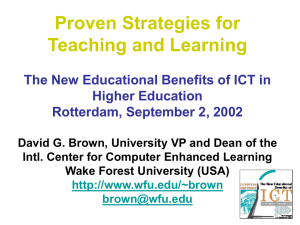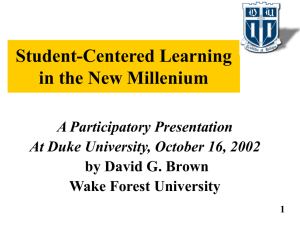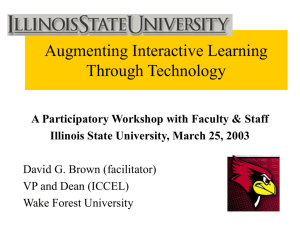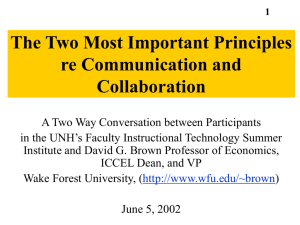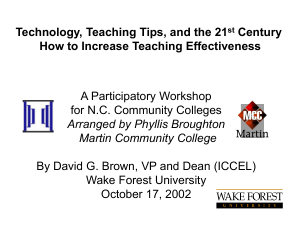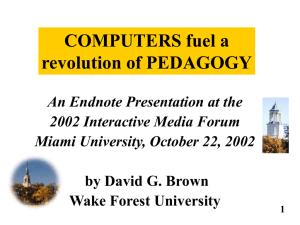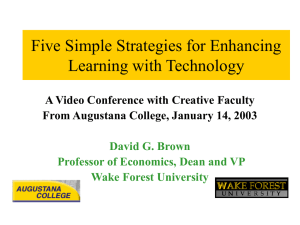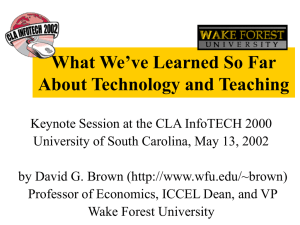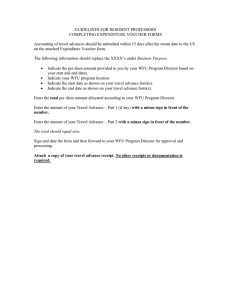Proven Strategies for Teaching and Learning International Conference on Computers in Education
advertisement
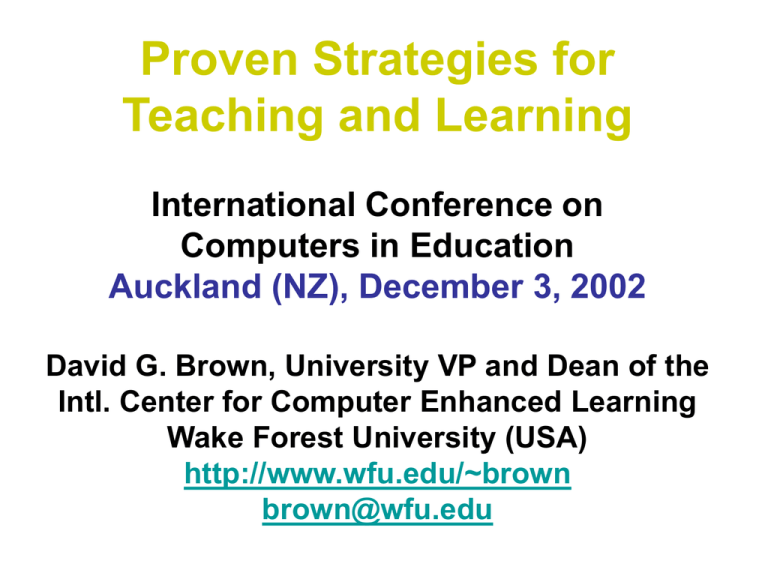
Proven Strategies for Teaching and Learning International Conference on Computers in Education Auckland (NZ), December 3, 2002 David G. Brown, University VP and Dean of the Intl. Center for Computer Enhanced Learning Wake Forest University (USA) http://www.wfu.edu/~brown brown@wfu.edu 2 The Fresh Intellectual Fashions Shape Decisions in Academe E X A M P L E S • Textbooks • Books of Reading • Role of Gender, Nationality, Ethnicity, and Age in Dissertation Research • Now Computers “…trends in teaching and learning will be shaped by the teaching strategies that are best supported by the computer and the associated Internet.” 3 Reasons 150 Professors Added Computer Enhancements 1. Communication-Interaction 2. Collaboration-Teams 3. Controversy-Debate 4. Customization-Diversity 5. Consultants-Adjuncts 4 • • • • • • • 3700 undergrads 92% residential 1300 average SAT 500 each: Med, Law, MBA, PhD $900M endowment 26th in US News & World Report Rhodes Scholars THE WAKE FOREST PLAN IBM A30, Pentium III, 1.13GHz Processor, 30GB Hardrive, 384 MB RAM 15”ActMatrix Screen, CD-RW/DVD, Floppy, 56k modem, 16MB Video Ram, 10/100 Ethernet, USB&Serial&Parellel&Infrared Ports • • • • • • • • • • IBM Laptops for all Standard Load Includes— MS Office, Dreamweaver, SPSS, Maple, Printers for all Acrobat, Photoshop, Shockwave, Flash, New Every 2 Years Net Meeting, Real Producer & Player, Media Player, Windows XP Moviemaker, Own @ Graduation Apple QuickTime, Netscape & Explorer, 31,000 Connections Netscape Calendar & Communicator, Standard Software Windows XP Professional 99% E-Mail Start 1995, 4 Year Phase In +15% Tuition for 37 Items +40 Faculty and 30 Staff 5 FIRST YEAR SEMINAR The Economists’ Way of Thinking: • To understand a liberal arts education as an opportunity to study with professors who think by their own set of concepts • To learn how to apply economic concepts • To learn how to work collaboratively • To learn computer skills • To improve writing and speaking Students = 15 All Freshmen Required Course 6 7 Communication-Interaction Computers Enhance Teaching & Learning Via-Presentations Better--20% More Opportunities to Practice & Analyze--35% More Access to Source Materials via Internet--43% More Communication with Faculty Colleagues, Classmates, and Between Faculty and Students--87% 8 Communication-Interaction •1247 emails •One Minute Quiz •Muddiest Point •Student Profiles •Booce Tournament 9 Collaboration-Teams •2 Students Submit 1 Answer •Edit Rough Draft Papers •PowerPoint in Class •Public Web Page •Name 3 Most Helpful Students Ways YOU Increase Communication/Interaction/Collaboration [with & without “the new technology”] - Ways YOU Increase Communication/Interaction/Collaboration [with & without “the new technology”] - Ways YOU Increase Communication/Interaction/Collaboration [with & without “the new technology”] - Ways YOU Increase Communication/Interaction/Collaboration [with & without “the new technology”] - 10 Controversy-Debate •More Class Time •Cross-Culture Projects •Best Web Sites •Competitive Team Projects •Double Jeopardy Quiz 11 Customization-Diversity •Cybershows (lectures, demos) •Personal Notes (email again) •Hierarchy of Help •Preview and Review •Just In Time Teaching 12 Consultants-Adjuncts •Alumni Editors •Globe Theatre •Guests in Class •Disciplinary Colleagues •Computer Tip Talks Ways YOU Customize and/or Use Consultants & Stimulate Controversy-Debate [with & without “the new technology”] - Ways YOU Customize and/or Use Consultants & Stimulate Controversy-Debate [with & without “the new technology”] - Ways YOU Customize and/or Use Consultants & Stimulate Controversy-Debate [with & without “the new technology”] - Ways YOU Customize and/or Use Consultants & Stimulate Controversy-Debate [with & without “the new technology”] - 13 The 5 C’s---New Opportunities Through Technology • • • • • Communication-Interaction Collaboration-Teams Controversy-Debate Customization-Diversity Consultants-Adjuncts 14 The Millennium Context • Personal. Customized. Interactive. • Learner-Centered Curriculum • Teams of Professionals to Support Learning • “Houses” instead of Disciplines • Hybrid Courses (80-20 and 20-80) • Loose-leaf Collections of Course Components, instead of Textbooks Your Reactions to Millenium List • Most Important to Anticipate – – – – – – Customized & Interactive Learner-Centered Teams of Professionals Houses instead of Disciplines Hybrid Courses & Curricula Chunks instead of Textbooks • Least Important to Anticipate – – – – – – Customized & Interactive Learner-Centered Teams of Professionals Houses instead of Disciplines Hybrid Courses & Curricula Chunks instead of Textbooks Thoughts About Conducting Faculty Workshops at Your Universities • • • • • • Understanding Wake Forest Strategies Getting Faculty to Attend Focusing on Meaningful Content Conducting the Workshops Other Tips YOUR successes Types of Workshops (for blended teaching) • • • • Basic Training provided by Library Professionals, in two-hour segments and groups of 5-15, usually around Course Management System routines Discipline-Specific Training provided by Computer Specialists within Each Discipline, in groups of 1-5. Highly sophisticated programs taught by Campus-wide computer experts, in three-hour segments to “the same” highly motivated group of about 15 faculty members Other one-on-one training is done by departmentally based specialists, by specially training students, and by the staff of our multimedia center (in the library) Getting Faculty to Attend • Use respected faculty as instructors • Garner the sponsorship of the TeachingLearning Center (not the technology center) • Hold sessions in the library (or a location equally respectable even to reluctant adopters) • Limit the aspirations of each session, so that faculty leave with a sense of achievement • Be prepared to take the workshop to a particular department, if asked Focusing Upon Meaningful Content • Start from Teaching Strategies, not educational theory & not specific software • Emphasize first the strategies that are best supported by technology--- i.e. interactive, collaborative, customized learning that is presented in a controversial format with assistance from adjuncts & consultants • Teach and support the low hanging fruit • Stress just-in-time sessions centered around the use of a Course Management System (e.g., Blackboard or WebCT) K I S S Running the Workshops • Always coffee, soda, and cookies • Lunch for all day sessions • Roving support staff who enable the “podium instructor” to keep moving, even when a particular individual needs special help • Printed material that accompanies presentation • Computers that are “identical” to the ones faculty will actually be using • Note to each faculty member’s department chair & dean regarding his/her participation Other Tips • Form learning pairs, so that each person has a “buddy” in the group • Identify an expert who will be ready to assist workshop participants after workshop day • Ask each department chair to name a faculty member within the department to serve as liaison to the technology training effort • Recognize that different disciplines use the computer in very different ways, and therefore require different training and helpdesk support Your Ideas/Tips Re Workshop Strategies - Your Ideas/Tips Re Workshop Strategies - Your Ideas/Tips Re Workshop Strategies - Your Ideas/Tips Re Workshop Strategies - 15 Student Teacher •My.wakeforest •Custom learning team •Custom delivery •Custom learning resources Learner-Centered Learning in the New Millennium 16 David G. Brown Wake Forest University Winston-Salem, N.C. 27109 336-758-4878 email: brown@wfu.edu http//:www.wfu.edu/~brown fax: 336-758-5012 ICCEL -- Wake Forest University, 2002
